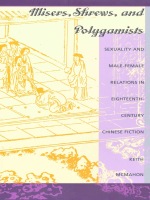2 books about McMahon, Keith

Misers, Shrews, and Polygamists
Sexuality and Male-Female Relations in Eighteenth-Century Chinese Fiction
Keith McMahon
Duke University Press, 1995
Having multiple wives was one of the mainstays of male privilege during the Ming and Qing dynasties of late imperial China. Based on a comprehensive reading of eighteenth-century Chinese novels and a theoretical approach grounded in poststructuralist, psychoanalytic, and feminist criticism, Misers, Shrews, and Polygamists examines how such privilege functions in these novels and provides the first full account of literary representations of sexuality and gender in pre-modern China.
In many examples of rare erotic fiction, and in other works as well-known as Dream of the Red Chamber, Keith McMahon identifies a sexual economy defined by the figures of the "miser" and the "shrew"—caricatures of the retentive, self-containing man and the overflowing, male-enervating woman. Among these and other characters, the author explores the issues surrounding the practice of polygamy, the logic of its overvaluation of masculinity, and the nature of sexuality generally in Chinese society. How does the man with many wives manage and justify his sexual authority? Why and how might he escape or limit this presumed authority, sometimes to the point of portraying himself as abject before the shrewish woman? How do women accommodate or coddle the man, or else oppose, undermine, or remold him? And in what sense does the man place himself lower than the spiritually and morally superior woman?
The most extensive English-language study of Chinese literature from the eighteenth century, this examination of polygamy will interest not only students of Chinese history, culture, and literature but also all those concerned with histories of gender and sexuality.
In many examples of rare erotic fiction, and in other works as well-known as Dream of the Red Chamber, Keith McMahon identifies a sexual economy defined by the figures of the "miser" and the "shrew"—caricatures of the retentive, self-containing man and the overflowing, male-enervating woman. Among these and other characters, the author explores the issues surrounding the practice of polygamy, the logic of its overvaluation of masculinity, and the nature of sexuality generally in Chinese society. How does the man with many wives manage and justify his sexual authority? Why and how might he escape or limit this presumed authority, sometimes to the point of portraying himself as abject before the shrewish woman? How do women accommodate or coddle the man, or else oppose, undermine, or remold him? And in what sense does the man place himself lower than the spiritually and morally superior woman?
The most extensive English-language study of Chinese literature from the eighteenth century, this examination of polygamy will interest not only students of Chinese history, culture, and literature but also all those concerned with histories of gender and sexuality.
[more]

Saying All That Can Be Said
The Art of Describing Sex in Jin Ping Mei
Keith McMahon
Harvard University Press, 2023
In Saying All That Can Be Said, Keith McMahon presents the first full analysis of the sexually explicit portrayals in the Ming novel Jin Ping Mei 金瓶梅 (The Plum in the Golden Vase). Countering common views of those portrayals as “just sex” or as “bad sex,” he shows that they are rich in thematic meaning and loaded with social and aesthetic purpose. McMahon places the novel in the historical context of Chinese sexual culture, from which Jin Ping Mei inherits the style of the elegant, metaphorical description of erotic pleasure, but which the anonymous author extends in an exploration of the explicit, the obscene, and the graphic. The novel uses explicit description to evaluate and comment on characters, situations, and sexual and psychic states of being. Echoing the novel’s way of taking sex as a vehicle for reading the world, McMahon celebrates the richness and exuberance of Jin Ping Mei’s language of sex, which refuses imprisonment within the boundaries of orthodox culture’s cleanly authoritative style, and which continues to inspire admiration from readers around the world. Saying All That Can Be Said will change the way we think about sexual culture in premodern China.
[more]
READERS
Browse our collection.
PUBLISHERS
See BiblioVault's publisher services.
STUDENT SERVICES
Files for college accessibility offices.
UChicago Accessibility Resources
home | accessibility | search | about | contact us
BiblioVault ® 2001 - 2024
The University of Chicago Press









